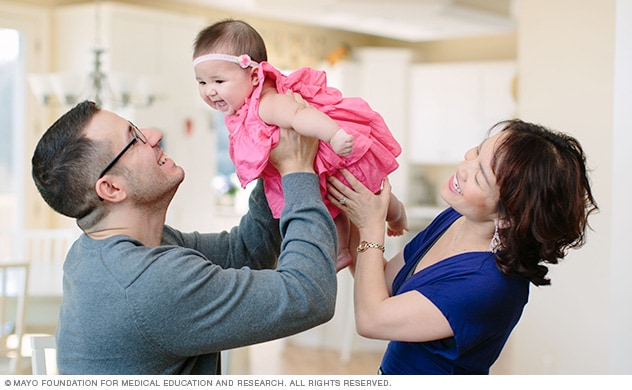
Parents with concerns about fertility-related disorders are cared for by the reproductive endocrinology and infertility team.
You may turn to the experts of the Division of Reproductive Endocrinology and Infertility if you have conditions related to infertility, including fibroid tumors, recurrent pregnancy loss, abnormal uterine bleeding, endometriosis and risk of genetic disorders in offspring. Our doctors are leaders in managing complex fertility problems, including infertility, cancer and fertility (oncofertility), diminished ovarian reserve, recurrent pregnancy loss, uterine fibroids, endometriosis, congenital uterine anomalies, and conditions with a risk of genetic disorders in offspring.
Mayo Clinic offers an integrated approach to diagnosis and treatment of fertility-related disorders, including fertility preservation and ovarian transplant. In addition, the clinic has the most advanced IVF laboratory featuring an incubation system that allows real-time observation of embryo development. Mayo is one of a few clinics in the United States to offer this technology. Our doctors are experts in fertility preservation for reproductive-age people with serious medical illnesses where treatment may impair future fertility.
Your visit to Mayo Clinic may include evaluation by doctors in other specialties and comprehensive diagnostic testing and counseling. The staff doctors of the Division of Reproductive Endocrinology and Infertility are board-certified in obstetrics and gynecology and reproductive endocrinology and infertility.
Reproductive surgeries
Many gynecologic surgeries can reduce your fertility. Our reproductive surgeons specialize in techniques shown to maintain or optimize your fertility potential. Specialists in this area use minimally invasive approaches to treat uterine fibroids, endometriosis, uterine polyps, uterine adhesions, and abnormalities of the uterus or fallopian tubes. They also perform outpatient microsurgery to reverse tubal ligations and offer innovative fibroid treatment options such as robotic myomectomy and MR-focused ultrasound surgery.
Fertility preservation
Fertility preservation services offered include:
- Freezing of unfertilized eggs (oocyte cryopreservation)
- Freezing of fertilized eggs (embryo cryopreservation)
- Freezing of ovarian tissue (ovarian tissue cryopreservation)
- Freezing of sperm (sperm cryopreservation)
For children at risk of impaired fertility due to medical treatments, Mayo Clinic Children's Center offers the Fertility Preservation Program.
Success of fertility services
Web resources
Society for Assisted Reproductive Technology: What are my chances with ART?
Mayo Clinic's success rates
Society for Assisted Reproductive Technology: Clinical summary report
The success of fertility services offered at Mayo Clinic results from the combined efforts of a team dedicated to providing care with compassion, expertise and innovation.
Understandably, if you're seeking fertility services, you would like some assurance that you are choosing a successful program. Keep in mind that success rates differ due to a variety of individual factors. Your reproductive endocrinologist can best help you evaluate the chances of success in your personal situation.
Success rates for in vitro fertilization (IVF) programs are readily available to the public. When choosing a fertility service provider, you may be tempted to compare programs based on success rates. However, many clinics and IVF programs publish success rates even though the Centers for Disease Control and Prevention and the Society for Assisted Reproductive Technology (SART) recognize that direct comparisons between clinics aren't possible:
- Different clinics have different patient populations and practice styles.
- Programs vary greatly in the screening process for people before an IVF cycle and may not be willing to care for someone with a particularly challenging history or medical condition.
Embryo development technology
At Mayo Clinic, fertility specialists provide high-quality care through expertise, attention to detail and innovation. Time-lapse imaging of embryo development is one example of an innovative technology that Mayo Clinic fertility specialists have adopted to provide patients with the very best outcomes.
LGBT services
Many people in the lesbian, gay, bisexual and transgender (LGBT) community face unique challenges in building a family.
The Mayo Clinic Assisted Reproductive Technology Program enthusiastically supports the reproductive needs of this community by offering a variety of reproductive services that enable family building, including:
- Donor sperm insemination
- Donor egg
- Gestational carrier cycles
- Use of both a gestational carrier and an egg donor
The first step is to schedule a consultation with one of the providers in the Division of Reproductive Endocrinology and Infertility to discuss the options and to make a plan that fits your needs.
Appointments
You may be referred to the Division of Reproductive Endocrinology and Infertility by your primary doctor, or you may request an appointment without a referral.
For appointments or more information about fertility services at Mayo Clinic's campus in Minnesota, call the Division of Reproductive Endocrinology and Infertility at 507-284-9792 from 8 a.m. to 5 p.m., Monday through Friday, or complete an online appointment request form.
See physician staff